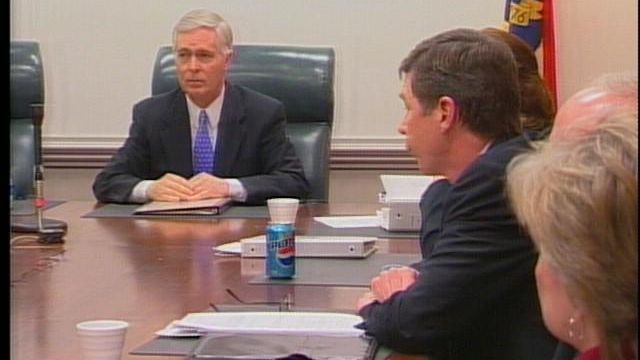Local News
Council of State Approves Death Penalty Protocol
The Council of State approved a revised plan for carrying out the death penalty in North Carolina. However, executions are not expected to resume anytime soon.
Posted — UpdatedRALEIGH, N.C. — By a 6-3 vote, state officials approved a revised procedure on Tuesday for carrying out executions in North Carolina, a step that potentially clears the way for the state to resume using the death penalty.
The new "execution protocol" was approved on a voice vote by the Council of State. Gov. Mike Easley said the vote would move the issue where it belonged—back before the courts and with lawmakers at the General Assembly.
The council—the governor, lieutenant governor and the elected heads of eight state government agencies—was forced into the state's ongoing debate over capital punishment by Superior Court Judge Donald W. Stephens. Last month, he placed three executions on hold, citing a law written in 1909 that requires the governor and the council to approve any change in the state's execution procedure.
State corrections officials changed the protocol while trying to resolve the role a doctor must play in the execution process.
State law requires a doctor be present at an execution, but the North Carolina Medical Board said in January that a "physician who engages in any verbal or physical activity ... that facilitates the execution may be subject to disciplinary action."
Meanwhile, the state said in response to a federal lawsuit challenging the constitutionality of lethal injection that a nurse and a medical technician , not a doctor, would monitor a condemned inmate's vital signs. The state said a doctor would only observe the execution and later sign a death certificate.
That change was apparently designed to satisfy both the medical board and the demands of the federal court, which had previously agreed to let an execution proceed only after the state said a physician and a registered nurse would be present to ensure the inmate did not suffer pain as he was put to death.
But the change also led to Stephens' ruling, and he stayed the executions of Marcus Reymond Robinson, James Adolph Campbell and James Edward Thomas until the council approved the new procedure.
Attorney General Roy Cooper, who voted to approve the new protocol and did not speak with reporters after the meeting, did not immediately return a call seeking comment about whether his office would ask Stephens to vacate his orders.
Secretary of State Elaine Marshall, Superintendent of Public Instruction June Atkinson and Insurance Commissioner Jim Long, all Democrats, voted against the proposal.
"I don't find that we've got jurisdiction to even get into an issue like this," Long said. "I'm very concerned about the Council of State trying to override the state medical board."
Although the council's vote should meet the requirements of the 1909 law, the new execution procedure appears to increase the role of a doctor. Instead of tasking a nurse and medical technician with monitoring an inmate's vital signs, it requires a physician to monitor "the essential body functions of the condemned inmate" and notify the warden if the inmate shows signs of "undue pain and suffering."
Several defense attorneys with clients awaiting execution have said that appears to conflict with the dictates of the medical board, which decided in January that a doctor's participation in capital punishment constitutes "a departure from the ethics of the medical profession."
"The way things have been done today are backward," said Ann Groniger, who represents Thomas. A spokeswoman for the medical board has said the organization won't comment on the new protocol until the full board reviews it.
Easley said he expected the overall question of what role doctors should play will be litigated for some time before ending up before the Legislature.
"No one anticipated the Council of State would be involved in this at this stage, given the complexity of the problem," Easley said.
That's an opinion shared both by defense attorneys and several lawmakers, who at a meeting Monday of a commission examining flaws in the state's death penalty system said the General Assembly must ultimately resolve the issue.
"I have never seen legislators run as fast away from taking on their legislative responsibilities as I have today," said Rep. Paul Luebke, D-Durham, after the panel decided to wait for Tuesday's council meeting before discussing a proposal for an execution moratorium.
"I don't understand ... why the General Assembly would not want to clarify the statute if we have the medical board saying a doctor can't participate even if the needle is put in improperly."
• Credits
Copyright 2024 by WRAL.com and the Associated Press. All rights reserved. This material may not be published, broadcast, rewritten or redistributed.





